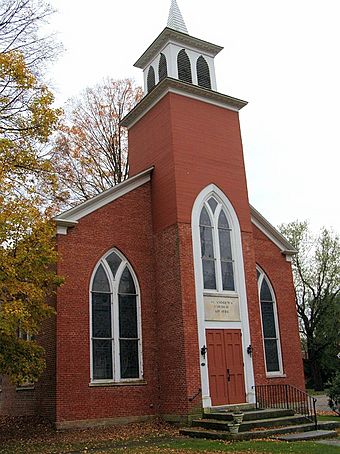St. Andrew's Episcopal Church (Washington, Connecticut) facts for kids
Quick facts for kids |
|
|
St. Andrew's Episcopal Church
|
|
 |
|
| Location | 247 New Milford Turnpike, Washington, Connecticut |
|---|---|
| Area | 0.3 acres (0.12 ha) |
| Built | 1822 |
| Architect | Wheaton, Rev. Nathaniel |
| Architectural style | Gothic Revival |
| NRHP reference No. | 94001443 |
| Added to NRHP | December 9, 1994 |
St. Andrew's is a very old Episcopal church located in Washington, Connecticut. It stands at 247 New Milford Turnpike in the small village of Marbledale. This church was built in 1822. It is thought to be one of the first churches in rural Connecticut built in the Gothic Revival style. Because of its history and special design, it was added to the National Register of Historic Places in 1994.
Contents
Exploring St. Andrew's Church
St. Andrew's Church is found in the quiet village of Marbledale. It sits on the south side of New Milford Turnpike. The church is made of brick. It has a square tower that sticks out from the front. The top parts of the tower are made of wood. There are also parts that stick out slightly on the sides, called transepts.
Church Design and Features
The church has special windows called lancet windows. These are tall and narrow, shaped like a pointed arch, which is typical of the Gothic style. They have marble sills and wooden frames. A brick addition was built at the back of the church in the 1900s. This new part provides offices, meeting rooms, and a kitchen for the church community.
A Look at St. Andrew's History
The St. Andrew's Episcopal church group first started in 1764. This was in a nearby town called New Preston. During the American Revolutionary War, many members of the church supported the British. Because of this, they faced difficulties. They had to leave their first church building and meet in private homes instead.
Rebuilding the Congregation
The church group came together again in 1791. For a while, they rented a local meeting house that belonged to the Quakers. Later, they bought it. This building was their home until 1816. The church building you see today was started in 1821. It was finished and ready for use in 1823.
Expanding the Church Building
The church was made larger in 1855. This expansion happened mostly because of Dr. Nathaniel Wheaton. He was one of the people who helped start Trinity College. He might have even been born in this area. St. Andrew's is very important because it's one of the earliest examples of Gothic Revival style in Connecticut. The only other known example that is older is Trinity Church on the Green. That church was built in 1814 in New Haven. It was designed by a famous architect named Ithiel Town.
See also



